 About GamePeople
About GamePeople
Subscribe to the Novel Gamer column:![]() RSS or
RSS or
![]() Newsletter.
Newsletter.
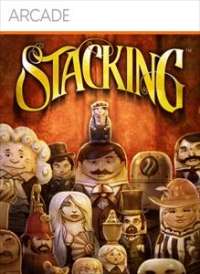
Format:
XBLA
Genre:
Strategy
Further reading:
Download
iTunes
Buy/Support:
Support Chris, click to buy via us...
Other GamePeople columnists have reviewed this from their perspective - huh?:
Story Gamer (360)
Scared Gamer (360)
Tech Gamer (360)
Reporting Gamer (360)
Podcast (360)
Tired Gamer (360)
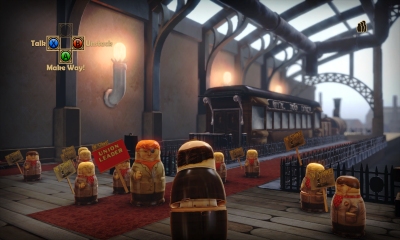
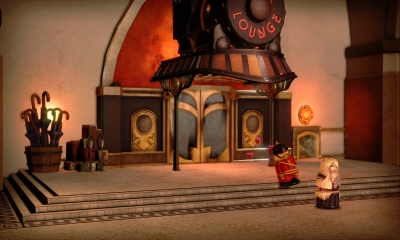
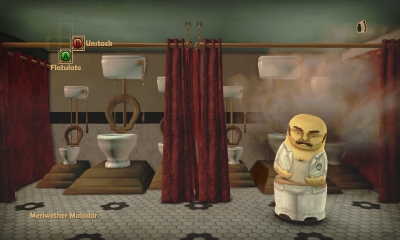
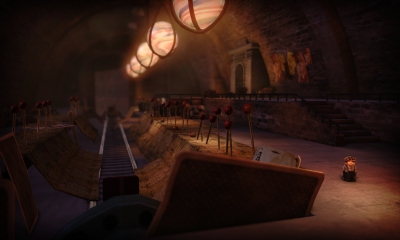
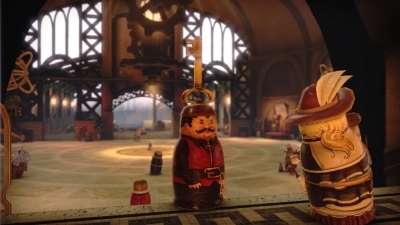
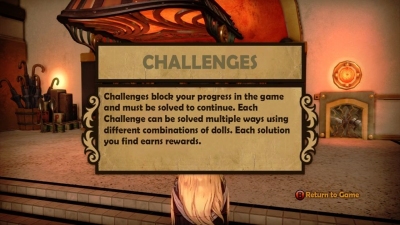
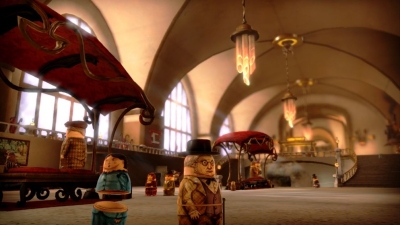
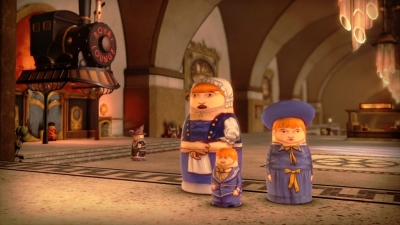
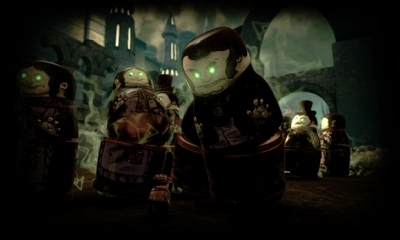

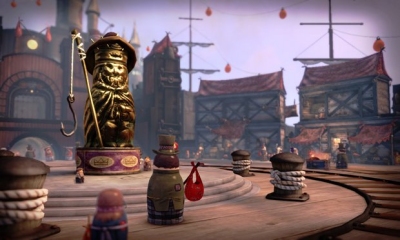


Stacking 360: An arts and culture journalist interviews a film director about Russian dolls, budgets and petit pois.
Download, subscribe via ![]() iTunes,
iTunes, ![]() Podcast RSS or
Podcast RSS or ![]() Email.
Email.
Jars of Clay A short story review based on Stacking for Playstation Network and XBLA In the latest of my series of interviews with pioneers, yesterday I had the opportunity to interview Sir Basil Abingdon, famous for early film and campaigning for grassroots film-making. Perhaps he is most known for the controversial "Stacking" - a gritty period-set documentary-drama about pre-war industry, child labour and the Russian Revolution. I sat down to talk with him at Les Haricots Blancs, Chelsea's latest exclusive restaurant catering to the epicurean elite of the city -- famous for its Cordon Bleu approach to simple meals. Its signature dish is "Les Haricots Blancs avec jus des tomates" a dish served upon bruschetta which is almost indistinguishable from classic Baked Beans on Toast. Indistinguishable that is, except for the £90 price tag. Sir Basil has been absent from the world of mainstream production for some time now. As I opened our discussion, I asked why he had himself made the change from the big studio productions of his past to these smaller, more personal artistic pieces. "The industry has become so terribly bloated, in recent years," Sir Basil began, "we have partaken in the creation of a culture which feeds upon huge, expensive spectacle -- but which punishes any which do not fall into the top 10% of successful productions. The decision to look for smaller, less risky and more brief projects was a very personal one." I replied, "I see. You have some personal experience of this situation?" Sir Basil sighed and toyed with his Poisson au frites avec petit-pois before replying: "my last project was caught in the cycle of over-ambition. It was an epic drama combining Norse mythology with modern rock music; it had a vast effects budget and a star name attached. Yet, it failed to meet mass approval and fell by the wayside." "So," I suggested, "you feel the material in that project was too high brow for a major production?" "No, it just wasn't very good." "Oh," I exclaimed. "The financial impact on my studio was very great. At that point we decided that if we were to continue we would look for smaller, more manageable projects." I nodded, "to allow you to pursue more personal, politically daring pieces?" Sir Basil replied, "All those things -- plus, if they turn out to be crap it won't bankrupt us!" I decided to move things along. "Sir Basil, your latest project has been described by some as visionary, daring, fresh and intuitively complex while detractors have described it as turgid, empty and repetitive while the rest simply said, 'I don't get it.' What was your initial aim when deciding to make a film around pre-revolutionary Russia, child labour and privilege using a set of stacking Russian dolls instead of -- what some would call -- proper characters?" Sir Basil thought about this for a moment. "There are two very important reasons for the use of the dolls. Firstly (and most importantly!) we realised that in a dramatic social upheaval such as the overthrow of political privilege and slave labour many different people bring unique skills and talents to events. While the social movement itself was therefore an amalgamation of the many skills and talents of a group of people, we needed to tell the story through a single character. Therefore by allowing our hero to wear other characters like a skin -- sometimes many dolls within dolls -- we felt we were representing the use of many varied abilities by the one character." I had to agree. When approaching Stacking I was struck how the complex interplay of skills, puzzles and solutions was so elegantly represented by the stacking mechanic. There was a time when adventures like this would have required the audience to undertake enormously complex tutorials just to understand how abilities can be modified and changed. The simple device of linking character to ability means that when stacking dolls together it is usually easy to see how the outcome will pan out. "Secondly, of course, using toy dolls is incredibly cheap. No-one can complain that our actors walk funny if all of them are simply waddling pots. We cut our effects and training budget tenfold!" He laughed haughtily at this and yelled to the staff, "steward!? More burgundy!" I decided to offer an opinion on the production to see what response this would elicit. I said, "I think when people come to Stacking they are immediately struck by how visually rich it is. The art, architecture and atmosphere of the time are wonderfully evoked. So well evoked, in fact, that it causes many viewers to ask one important question." Sir Basil briefly paused in quaffing his latest glass of burgundy and stared at me a little curiously. "What question is that?" he asked, warily. I braced myself, "the question of when and where it is actually set." He was silent. As there was no immediate response I forged ahead, "there doesn't appear to be any coherent adhesion to a point in time, or even the setting of a particular country. The central characters have a profoundly British appearance, yet the antagonists bear close similarity to pre-war German barons; meanwhile the use of the Matryoshka Dolls inevitably adds a Russian flavour to the proceedings." Sir Basil looked irritated for a brief moment and then drained his glass. "It's set in an era known as the Tentwenthirties," he eventually stated, resolutely. "The Tenwhatnow....?" I replied, confused. "Look," Sir Basil said, irritably changing tack, "don't make the mistake of believing, as many have already, that Stacking is an historical piece. There are elements of history we have taken and amalgamated in order to tell a cautionary tale about privilege and slavery in very broad terms. As much as it may surprise you to hear, neither our nation's children -- nor any other nations' children, as far as I know -- were saved from enforced labour by a tiny chimney-sweep who infiltrated a steam ship, Zeppelin and triple-decker locomotive by climbing into the backsides of passers-by to inherit their abilities! Don't treat it as a history lesson. It's a piece of entertainment, no more. We wanted to tell an interesting story." I responded with "fine. Did you manage it?" He was taken aback. "Whatever do you mean!" he demanded I clarified, "Did you manage to tell an interesting story?" Sir Basil was incandescent, "what is that supposed to mean? Didn't you see it, sir -- isn't that why you're interviewing me!?" I raised my hands in a gallic shrug and said, "I lost track of it to be honest. The opening scene with the working-class family seemed to go on forever. Then, just when things seemed to be moving forward the main character got waylaid by a homeless guy who then proceeds to prattle on for ages. I found it... heavy going." If I'm being totally truthful I was goading him for a reaction. I did actually see it through - as any good journalist should endeavour; but, I wanted to gauge his reaction to this tricky issue, because the fact remains that much of the storytelling in Stacking is overlong. It uses a style and pace of action last used during the silent movie era, before audience boredom was invented and patented in 1953 by J.D. Wallajacker, effectively halving attention spans overnight and allowing new-found distraction to... Oh yeah! Also I'd love to tell you what else Sir Basil had to say during our interview, but in the interests of edification and decency I must sadly take his choice closing words to the grave with me. Looking back to the day of the interview I can reflect that I gave Sir Basil a hard time. It is true that Stacking makes vague sociological comment without ever committing to a historical fact and it is also true that many of the story scenes are long, slow and repetitive. However, Stacking's strength lies with its rich cast of unique characters taken from the pages of history books -- or at least those history books with colouring-in sections. To get more of a perspective on this I talked to Tiny Timmy Tickler -- at the time a child star who played "Hans" in Stacking now a hulking brick toilet of a man.. I asked him how he became involved in the production. "I had a dreadful nut allergy," he began in a deep, slow voice, "Any nut-related produce makes me violently sick." There was silence as I tried to eke out the relevance to my question. I said, "Right. And how did that get you the part in Stacking?" "Oh that's simple enough," he replied, "one of the sight gags they wanted for the film involved a small kid that could puke on demand. They filled me full of pecan cookies and pushed me in front of a camera." I expressed horror at this abuse of a young talent, but Mr Tickler was tolerant. "That was the kind of production it was," he explained, "nearly everybody in Stacking had some kind of unique quirk. These were used either for puzzle elements or just for visual humour. I think the fun in Stacking is looking at all the different characters and how they interact with each other; like the starlet who feigns death every time a camera is pointed at her, or the bus boys who float around on tiny balloons. It's like a carnival of unique and wonderful characters. You could lose yourself for hours, just wandering around..." From the vacant look that crossed his face, I detected that I had lost the attention of the gentle giant that Tiny Timmy Tickler had become, but I reflected upon his words. It may be that I distracted myself with looking at the deep meaning, the film style or the accessibility of Stacking. The strength of Sir Basil's creation lies with its cast of misfits -- freaks brought out to illustrate a story but who in the same way find their own release. Stacking is a playground of unique faces and abilities unfettered by historical fact or practical reality. There is an old parable about talents hidden within jars of clay and I can't help feeling that Stacking's brilliance is similarly obscured within these curious wooden dolls. Therefore, with such an intuitive and delightful premise and a cast which can be drawn and redrawn from any part of a wild imagination, will we be seeing more of Stacking in the future? I'd say the odds are stacked in its favour.



Chris Jarvis writes the Novel Gamer column.
"I write stories to say what I think about games, for me it's the only way I can really communicate what I feel about them. Do you ever have a response to something that's hard to put into words? I find that sometimes I have something to express that can't be communicated by trying to explain how I feel, directly."
Here are the games I've been playing recently:
© GamePeople 2006-13 | Contact | Huh?

|
Family Video Game Age Ratings | Home | About | Radio shows | Columnists | Competitions | Contact
With so many different perspectives it can be hard to know where to start - a little like walking into a crowded pub. Sorry about that. But so far we've not found a way to streamline our review output - there's basically too much of it. So, rather than dilute things for newcomers we have decided to live with the hubbub while helping new readers find the columnists they will enjoy. |
Our columnists each focus on a particular perspective and fall into one of the following types of gamers:
|